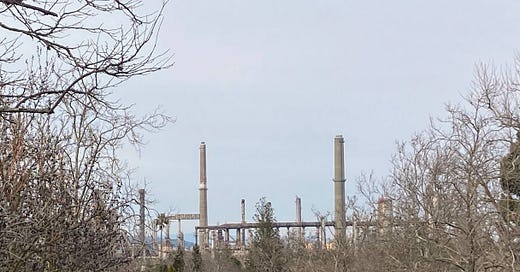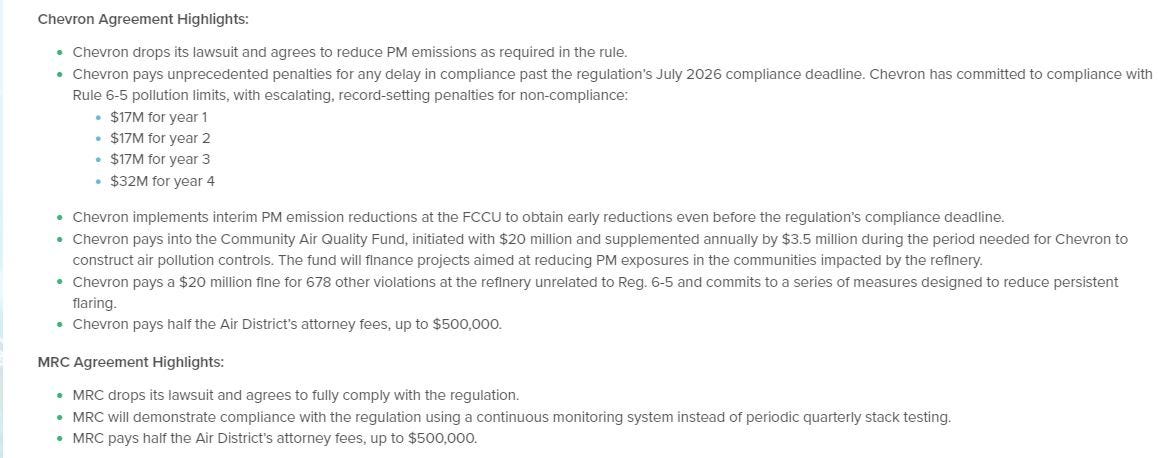Settlement Reached Between Air District and Martinez Refinery over New Air Emissions Law; No Wet Gas Scrubber at MRC; Plus, Latest Edition of "News You Can Use"
Martinez mayor expresses disappointment, calling settlement "lopsided"; latest roundup of Martinez events and activities
Before providing the latest installment of “News You Can Use” for paid subscribers, here’s a quick update on a major settlement reached this week between the Bay Area Air Quality Management District (BAAQMD) and PBF Energy, owner of the Martinez Refining Co.
According to the announcement released Tuesday, MRC has agreed to drop its lawsuit against BAAQMD over Rule 6:5, which was adopted by the agency in 2021 and requires an 80% reduction in particulate matter emissions from the refinery’s fluidized catalytic cracking unit (as well as a 70% reduction at Chevron’s Richmond refinery).
As part of the settlement, both refineries have agreed to comply with the standards set forth in the rule. But in an unexpected twist, MRC plans to do so without installing a device known as a wet gas scrubber — which was assumed to be the only technology available capable of meeting the stringent standards of Rule 6:5, billed by BAAQMD as the the “most health protective rule of its kind in the nation.”
Rather, MRC said in a statement that it will comply with the rule through an “Alternative Emission Monitoring System (AEMS)” that was developed in collaboration “with technical experts in process engineering and air quality.” MRC said that the air district approved of the “innovative technical solution.”
The installation of a wet gas scrubber, which exists at Valero’s refinery in Benicia, was a major focus for community and environmental activists in Martinez who pressured MRC for the better part of the year to drop the lawsuit. In a proclamation passed by the City Council in October calling on MRC to comply with regional air emissions standards, it was noted that the refinery’s lawsuit against BAAQMD sought to “avoid installing a wet gas scrubber to meet this emissions limit, citing a lack of physical space and ‘adverse cost, operational, and business impacts’ as reasons for non-compliance.”
Exactly how the refinery’s new AEMS will achieve the same emissions reductions as a wet gas scrubber was not immediately clear; a request I made of the refinery for clarification on that point wasn’t immediately answered.
Martinez Refining Co. as seen from the Parkside development.
The settlement also specified that MRC would adhere to the new rule through “a continuous monitoring system instead of periodic quarterly stack testing,” which BAAQMD says will be more robust system of determining compliance.
Chevron will install a wet gas scrubber at its Richmond refinery to comply with the settlement.
While the settlement includes a $20 million fine for 678 other violations at Chevron’s refinery unrelated to Rule 6-5, there was no agreement to any fines involving MRC for its string of hazardous materials releases that have impacted the Martinez community since the spent catalyst accident on Thanksgiving night 2022 that spewed at least 20 tons of toxic dust into surrounding neighborhoods. The Contra Costa District Attorney’s Office, BAAQMD, the California Department of Fish and Wildlife and Contra Costa Health announced a “joint civil enforcement action” against MRC in November stemming from the spent catalyst release a year earlier, as well as other unspecified “enforcement claims.” No further information has been released since the announcement, which followed a DA investigation that was launched in January 2023 into the spent catalyst incident.
Tuesday’s BAAQMD settlement with Chevron and MRC also included “unprecedented penalties” against Chevron “for any delay in compliance past the regulation’s July 2026 compliance deadline.” However, no such prospective penalties were included for MRC, as the air district said the refinery had agreed to “fully comply with the regulation.”
Chevron is also required, according to the settlement, to pay into the “Community Air Quality Fund, initiated with $20 million and supplemented annually by $3.5 million during the period needed for Chevron to construct air pollution controls. The fund will finance projects aimed at reducing PM exposures in the communities impacted by the refinery.”
Martinez Mayor Brianne Zorn said in an email to me that for Martinez, “automatic distributions to local community funds is still in the works with the air district” and that all “penalties associated with existing violations (catalyst, flaring, etc.) are still with the DA.”
While BAAQMD labeled the settlement a “decisive victory,” Zorn, who has become increasingly critical of the refinery as the hazardous incidents have continued since the Thanksgiving 2022 release, had a different take, saying that she was “disappointed in the agencies and the lack of protection of the Martinez community” and that she considered the settlement “lopsided.”
“I don't want to be told that our local refinery has over a hundred air emission violations, but the settlement indicates they are on track to meet the threshold.”
The following roundup of upcoming events and activities in Martinez by freelance writer David Scholz is provided to paid subscribers only. Please consider becoming a paid subscriber for $5 a month or $50 annually if not already to take advantage of content such as this and fund more local news coverage of Martinez.
Keep reading with a 7-day free trial
Subscribe to Martinez News and Views to keep reading this post and get 7 days of free access to the full post archives.





